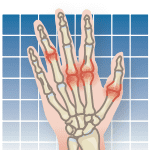Just like a rusty hinge on a door, a shoulder joint insulted by pain, injury or a chronic condition like arthritis can become immovable. As swelling and stiffness settle in, the shoulder can feel like its immobile-literally frozen. This so-called adhesive capsulitis occurs when the sac of ligaments surrounding the shoulder joint (or the articular shoulder capsule) swells and stiffens, causing tightness that restricts movement. While experts do not fully understand why frozen shoulder occurs, its a fact that the condition typically affects women between 40 and 60 years of age. Having arthritis in the shoulder joint can add insult to injury, according to Cleveland Clinic Sports Health & Orthopaedic Rehabilitation physical therapist Mark Kalinowski, PT, OCS. Frozen shoulder usually starts as a dull ache that gradually worsens, explains Kalinowski. Soon, just reaching for something on a shelf can be very painful. In severe cases, the joint becomes very rigid and stiff and loses all mobility.
To continue reading this article or issue you must be a paid subscriber.
Sign in





























